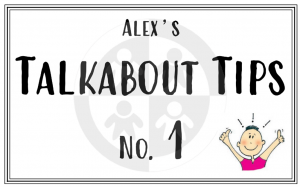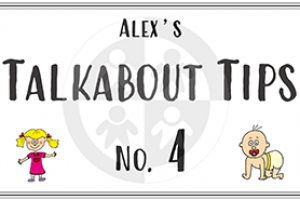How do we learn to say what we want to say in a way that other people want us to say it?… or the art of being socially skilled!
Welcome to my first issue of Alex’s Talkabout Tips! This is something I have been wanting to do for a while, but with everything that has been going on in the world, it has not felt like the right time. But I’m here now, and I would love to hear what you think.
Who am I?
 My name is Alex Kelly and I am the author of a number of books, including the Talkabout books which are all aimed at helping you to teach or develop social skills, self-esteem and friendship skills. I am a speech and language therapist based in the UK and I run my own businesses – one is called Speaking Space Ltd, and we provide a day service for adults with an intellectual disability and speech therapy in local schools, and the other is called Alex Kelly Ltd, which provides training and support in social skills.
My name is Alex Kelly and I am the author of a number of books, including the Talkabout books which are all aimed at helping you to teach or develop social skills, self-esteem and friendship skills. I am a speech and language therapist based in the UK and I run my own businesses – one is called Speaking Space Ltd, and we provide a day service for adults with an intellectual disability and speech therapy in local schools, and the other is called Alex Kelly Ltd, which provides training and support in social skills.
Why and what are ‘Alex’s Talkabout Tips’?
I am calling these blogs ‘Alex’s Talkabout Tips’ – but that doesn’t mean I am going to limit myself to writing about ‘Talkabout’ (my books) – I intend to write about all aspects of social skills, self-esteem and friendship skills… what they are, why they are as they are, why they are important, what can we do about them, and how you can help others to develop them. I may of course, on occasions, link you to my books, but if you just want to find out about those, please do check out the pages on my website that give you more information about them.
So, what’s in my first issue of Talkabout Tips?
In this first issue of my ‘Talkabout Tips’ I will describe what we mean by the art of communicating effectively with others and I will describe the seven components to being socially skilled or socially competent.
I am starting with this topic, because I believe that if we can define social skills, it will help us to understand it, which in turn will help us to recognise when something goes wrong, either in our own ability to be socially skilled or in someone else’s!
The art of communication
The art of communication is both complicated and amazing. At a basic level it involves 2 people, a message to communicate, the ability to communicate it, and then the ability to receive it.
But if I want to make sure that my communication is effective, I also need to make sure that:
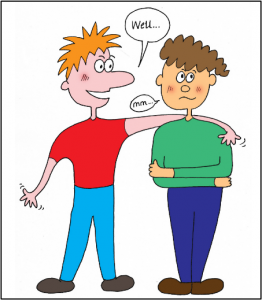 it is done accurately… I say what I wanted to say
it is done accurately… I say what I wanted to say- it is said in an appropriate manner… I say it in the right way, with appropriate nonverbal and verbal behaviours
- it happens in a timely manner… I say it when it needs to be said and at the right time in the conversation
- it is appropriate to the context…I say it in the right situation
- and that if there is a breakdown at any point, that I repair it… for example, I correct the other person if they have misunderstood.
And a lot of this involves my social skills. So what do we mean by social skills? Or being socially competent?
A definition of being socially skilled
Being socially skilled means being able to use our social skills, or behaviours, appropriately when we interact with others, and if we use them appropriately, we are judged by others to be socially competent. So, our social skills enable us to be seen as socially competent by others.
There are 7 components to defining social skills which I will describe below.
1 – Social skills enable us to achieve our desired outcome.
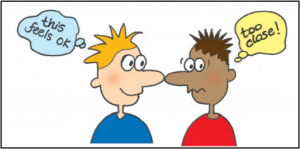 This means that our socially skilled behaviours are ‘goal directed’ – we want something, so we behave in a way to get it. For example, if I want you to carry on talking to me, I will look at you, nod my head, use listening noises – all purposeful behaviours to get the outcome I want.
This means that our socially skilled behaviours are ‘goal directed’ – we want something, so we behave in a way to get it. For example, if I want you to carry on talking to me, I will look at you, nod my head, use listening noises – all purposeful behaviours to get the outcome I want.
2 – Social skills include nonverbal and verbal behaviours.
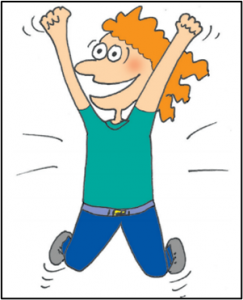 We judge whether someone is socially skilled based on how they behave – how they use their eye contact and facial expression (their nonverbal behaviours) as well as their ability to start the conversation and take turns (their verbal behaviours). I will describe these in more detail in a future Talkabout Tips – so watch out for that one.
We judge whether someone is socially skilled based on how they behave – how they use their eye contact and facial expression (their nonverbal behaviours) as well as their ability to start the conversation and take turns (their verbal behaviours). I will describe these in more detail in a future Talkabout Tips – so watch out for that one.
3 – Socially skilled behaviours are interrelated.
 We tend to use several behaviours at a time – so when we are listening, we will use good eye contact, nod our head, and make sure our facial expression is appropriate. That is why it can be hard to isolate exactly what someone has done to make us feel uncomfortable, threatened, valued etc. We need to look at clusters of behaviours and also recognise that one will have an impact on another. This helps when we are teaching social skills, because some are easier to teach and will naturally have a positive impact on another skill – more to follow on that too!
We tend to use several behaviours at a time – so when we are listening, we will use good eye contact, nod our head, and make sure our facial expression is appropriate. That is why it can be hard to isolate exactly what someone has done to make us feel uncomfortable, threatened, valued etc. We need to look at clusters of behaviours and also recognise that one will have an impact on another. This helps when we are teaching social skills, because some are easier to teach and will naturally have a positive impact on another skill – more to follow on that too!
4 – Social skills are learned behaviours.
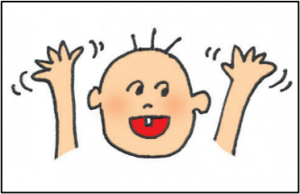 The way we communicate with others is a primarily learned response – we learn through imitation, modelling, and reinforcement. Which is great news – because it means that if social skills are learned, we can teach them later on if they have not developed naturally for one reason or another.
The way we communicate with others is a primarily learned response – we learn through imitation, modelling, and reinforcement. Which is great news – because it means that if social skills are learned, we can teach them later on if they have not developed naturally for one reason or another.
5 – Social skills should be appropriate to the situation.
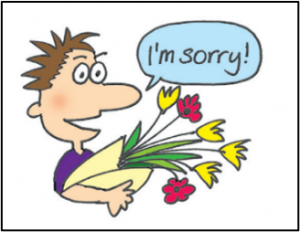 We need to behave in a way that will be judged by others as ‘competent’, so to be truly socially skilled, we need to learn the behaviours and then learn to use them in a way that is acceptable to the other person and the context. For example, you may have learned a new cool way to greet your friends, but that doesn’t mean you should use it when you greet your granny…
We need to behave in a way that will be judged by others as ‘competent’, so to be truly socially skilled, we need to learn the behaviours and then learn to use them in a way that is acceptable to the other person and the context. For example, you may have learned a new cool way to greet your friends, but that doesn’t mean you should use it when you greet your granny…
6 – Socially skilled people know when to talk, what to say and how to say it.
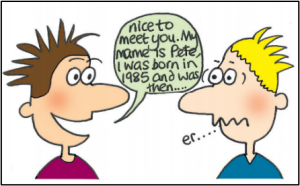 This is linked to the previous point; in that we need to learn when to use certain behaviours as well as what and how to use them. So, saying the right thing at the wrong time can be as bad as not saying the right thing at all. So I may have learned to tell someone how I feel, but I then need to judge when and how to do it.
This is linked to the previous point; in that we need to learn when to use certain behaviours as well as what and how to use them. So, saying the right thing at the wrong time can be as bad as not saying the right thing at all. So I may have learned to tell someone how I feel, but I then need to judge when and how to do it.
7 – A socially skilled person reads their audience and shapes their responses
 We need to learn to read the other person – to try to work out what they are thinking so that we can adapt our responses accordingly. If I have made you feel uncomfortable by getting too close, I need to recognise that in your face, your behaviour, and I need to step back. And children who are good at this, tend to be better at making and keeping friends.
We need to learn to read the other person – to try to work out what they are thinking so that we can adapt our responses accordingly. If I have made you feel uncomfortable by getting too close, I need to recognise that in your face, your behaviour, and I need to step back. And children who are good at this, tend to be better at making and keeping friends.
So, in summary…
…a socially skilled person is someone who communicates using learned behaviours that are appropriate to the situation and the other person, and their communication is effective, in that it has the desired outcome. It’s about saying the right thing in the right way at the right time.
I hope you have enjoyed reading my first blog! Please do comment on Facebook or share this with others. If you would like to be added to my email distribution list, please contact me through the website or email me directly or PM me.
Thanks for reading!
Alex


